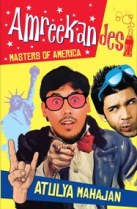Advertising Ka Jalwa
‘Please don’t go away. We will be right back after a ‘short’ break.’
Advertisements. Hate them or love them, you just cannot escape them. Every ten minutes, in the middle of a highly engrossing match or a TV show, you are subjected to random models or celebrities strutting their stuff across your screen, and urging you to buy products that you will never need to use. So whenever Priyanka Chopra poutily proclaims, ‘It’s not just a phone, it’s who you are,’ or Sachin declares that Boost is the secret of his energy, we have young boys and girls who will insist on buying the very brand that his or her favourite celebrity endorses, regardless of whether they really need it, or whether it is the best product available in the market, or whether they can afford the really expensive ones.
Advertising, on the whole, disgusts me. Because the basic message you’re sending out to people is that - ‘You’re not good enough’. Look at Fair and Lovely. Arre wah, you’re telling people that you cannot achieve success unless you are fair, especially in the ad in which a dark-skinned girl with the voice of an angel is shunned simply because she’s dark. Once she uses their magical product, people start appreciating her (Really?!). Or Axe. You cannot attract chicks unless you wear our deodorant. Complan - You cannot grow taller unless you drink our growth-enhancing potion. I could go on, but I think you get what I’m saying.

After some thought, and endless discussions with vella friends, I came to the conclusion that the advertising industry thrives on two things - insecurities, and envy. So my friend has so-and-so TV? Wow, I am so jealous. There is even a tagline - ‘Neighbour’s envy, owner’s pride.’ So you’re supposed to buy these products simply to show off, regardless of whether you need them or not? That is simply plain foolishness. What these advertisements do, is play on the insecurities of the public. You’re not thin enough. You’re not tall enough. You’re not fair enough. You’re not good enough. So you want to be an actress but you’re not fair enough? Cool, use Fair and Lovely. You don’t have long hair? Use Garnier Fructis. Is your kid short? Stop being an irresponsible mom and give him Complan. You’re fat? Ditch the sugar and get Sugar Free, pronto. Broke up with your partner? Put on your Fastrack watch and move on, man. For every problem, there is the solution, right on your TV screen.
Apart from these physical insecurities, these ads also tap into emotional conflicts. For example, you have a shampoo ad wherein a little girl asks her working mother why her hair isn’t long like other girls. The mother then dissolves into a pool of guilt, while the daughter ruefully stares at another girl’s lustrous locks. The solution? Use Clinic Plus, and you will have a long lustrous mane in no time! Another one is the one in which a working mom comes back home after a long, tired day and her bouncy little kid wants to play with her, but she isn’t able to, because of back pain. The ever-devoted, pati parmeshwar husband massages her back with some cream, and she is back on her feet, playing with her kid. Maybe the intent wasn’t to make working mothers feel that they aren’t devoting enough time to their kids, but this is the message the advertisers are sending out. Their argument - Ganda hai, par dhandha hai, what to do!
But cola ads take the cake. Fizzy soft drinks - pumped with endless carbon dioxide, with a pH of 1.2, highly acidic and excessively sweet (seven spoons of sugar in a litre, duh!). And yet the advertisers, through beautiful faces, somehow manage to convince us that by drinking them, we can overcome our fears and go out and win, or taste the thunder (someone please tell me it is they are trying to say!) or can bring about peace in this world, simply by sharing a bottle of cola. Fact is - if a celebrity does not endorse any cola brand, they cannot sell a single bottle.
Which is not to say that all the commercials we see on our television are bad. There are products which we genuinely need, and are basic necessities - fair enough. There are creative advertisements which never fail to fascinate me - Airtel ads, for instance. What needs to stop is the shallow, glitzy, unrealistic portrayals, endorsing almost harmful products - and luring the unsuspecting public to buy products that isn’t going to do them any good.





Half way down the post, I got a feeling these cannot be Amreekandesi thoughts. The footnote proved me right ! :)
I think the most shocking and a must see documentary I saw on marketing and advertising was “Consuming Kids”. And the recent documentary/film made by the “Supersize me” guy, “The Greatest Movie Ever Sold” took a nice below-the-belt-punch at the marketing industry. It could not get more shameless than that :)
And it was just yesterday when I was reading about Coca Cola boosting their sales in emerging markets with India taking the lead. A shocking increase of 20% (http://www.bbc.co.uk/news/business-17742632). It is funny how we Indians hail the Padma Bhushan Indra Nooyi for selling sugar pumped aerated drinks.
About fair and lovely, you are what you consume. Your products merely reflect prevailing cultural norms and values. You have to learn to look at the cause instead of complaining about the symptoms.
You’re right. India is a country obsessed with fairness, and these products are simply exploiting this obsession. My problem is that they’re making people feel like they’re less beautiful simply because they’re not fair.
My problem is that they’re making people feel like they’re less beautiful simply because they’re not fair.
They aren’t the ones doing this, society is. I’ve said this many times, but Indian values need a massive overhaul. Unfortunately this would require some introspection, which Indians are not good at. Throughout the centuries Indians have been passive receivers of culture since culture flowed from the top (Brahmin) to the bottom. It’s time to critically examine some of these values.
Indian culture has always celebrated beauty in all forms, I mean we have deities like Rama and Krishna and Maa Kali who are dark, yet considered extremely beautiful. About the advertisers, well, at the end of the day they are selling stuff because there are people who want to buy it. I’m saying they shouldn’t sell it by playing on people’s insecurities and making them feel less good about themselves.
You have to stop seeing advertisers as a separate species insulated from the culture they are a part of. Why shouldn’t they profit from the insecurity of the masses? Why should marketers be held up to a moral standard when the rest of society is not?
Indian culture has always celebrated beauty in all forms, I mean we have deities like Rama and Krishna and Maa Kali who are dark, yet considered extremely beautiful.
This is true. However I strongly suspect that our obsession with fairness pre-dates the British. The higher castes (on average) tend to be fairer than the lower ones. The Caucasoid actors of Bollywood are predominantly from the Brahmin and Kshatriya castes. There are exceptions ofcourse. Culture is learned behaviour, and we learn ours from the Brahmins, our superiors in every way. Gurcharan Das says that the Indian’s elitist and contemptuous attitude towards blue collar work is acquired by imitating the Brahmins contempt for the Shudra labourer in historic times. It’s quite like then, that our obsession for fairness is also learned from the upper castes.
Why are you bringing caste equations in this? And I have nothing against advertisers - I myself admire how they can tell a wonderful story in less than a minute. What I hate in these fairness cream ads is their hypocrisy and shallowness. Why, can’t I be successful career-wise or get married if I am not fair? Do I have to use a fairness cream to achieve anything in life? That’s just plain stupidity.
Because ultimately most of our social ills are tied to caste one way or the other. And since our culture flows in one direction only, I suspect we’ll have to put up with things like this since we are powerless to change our culture.